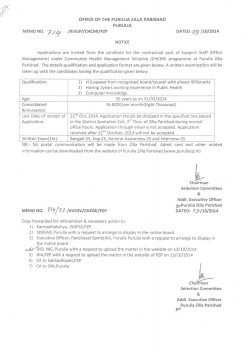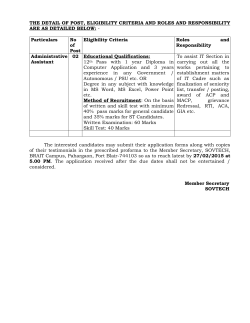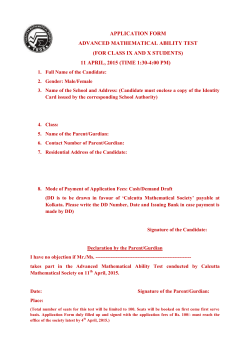
Higher Doctorates by Publication Policy
Higher Doctorates by Publication Policy Doctor of Letters (DLitt) | Doctor of Science (DSc) Doctor of Philosophy by Publication (PhD) Approving authority Academic Committee Approval date Advisor 19 March 2015 (1/2015 meeting) Dean | Griffith Graduate Research School | ggrs-dean@griffith.edu.au | (07) 373 57290 Next scheduled review 2019 Document URL http://policies.griffith.edu.au/pdf/ Higher Doctorates by Publication Policy.pdf TRIM document 2015/6008001 Description This policy covers higher doctorates that are awarded by the University in recognition of substantial scholarly achievements especially through published works. Related documents Intellectual Property Policy Higher Degree Research Policy Student Academic Misconduct Policy Academic Misconduct Policy - Higher Degree Research Students Griffith University Code for the Responsible Conduct of Research Fees and Charges Policy Student Administration Policy Conflict of Interest Policy Statement Regarding Integrity of Student Admissions, Scholarships and Prizes, Processes and Decision Making at the University Higher Degrees Research Website [Scope] [Definitions] [The Degree] [Admission] [Conditions of Candidature] [Form of Submission] [The Examination] [Award of the Degree] 1. SCOPE 1.1 This policy prescribes the requirements for the award of Higher Doctorate qualifications, including the Doctor of Letters (DLitt), Doctor of Science (DSc), and Doctor of Philosophy by Prior Publication (PhD Prior Pub). Higher Doctorates are not Higher Degree Research (HDR) programs and are therefore not reported to Government as an HDR completion. Refer to the Higher Degree Research Policy for conditions for the award of HDR programs, including the Doctor of Philosophy (PhD). Elaboration of this policy is available on the Higher Degree Research Website. Where there is an inconsistency between the policy and the website, the policy applies. 1.2 DLitt, DSc The Council may confer the degrees of Doctor of Letters (DLitt) and Doctor of Science (DSc). These prestigious degrees are awarded to eminent doctoral graduates who have made outstanding contributions to their field and who have had a substantial association with the University. 1 Higher Doctorates by Publication Policy 1.3 PhD by Prior Publication The PhD (by Prior Publication) arrangement enables the degree of PhD to be awarded to candidates on the basis of their original scholarly contribution to knowledge in research areas of strategic importance to the University. The purpose of the program is to allow formal recognition of established researchers who do not already hold a doctoral level qualification, who have substantial international standing in their respective fields on the basis of their record of academic publication, and for whom enrolment in the existing PhD program would be inappropriate. Previous association with the University is not required. 2. DEFINITIONS AQF qualification is a completed University accredited program of learning that leads to formal certification that a graduate has achieved the learning outcomes as described in the AQF. Discipline refers to a defined branch of study or learning consistent with the field of education classification in the Australian Standard Classification of Education (ASCED). The ASCED includes 12 broad fields of education with each classification further divided into narrow and detailed fields of education. Same discipline qualifications are designed to deepen knowledge, skills and application and different discipline qualifications are designed to broaden knowledge, skills and application through further learning. Domestic students (candidate) refers to students who are an Australian citizen; or an Australian permanent resident or holder of an Australian Permanent Humanitarian visa; or a New Zealand citizen. Elements include Schools, Departments, Research Centres, Colleges, Institutes, other budget elements in which students are enrolled, as well as central administration and support units. Field of study refers to the main focus of work activities and/or a learning program. Refer also to Discipline. Full-time equivalent (FTE) refers to the duration of candidature expressed as full-time equivalent where a student undertakes part-time study. Higher Degree by Research (HDR) refers to a Research Masters or Research Doctorate where a: Research Masters means a Level 9 qualification as described in the AQF and where a minimum of two-thirds of the program of learning is for research, research training and independent study. Research Doctorate means a Level 10 qualification as described in the AQF and where a minimum of two years of the program of learning, and typically two-thirds of the qualification, is research. Higher Doctorate refers to a doctoral degree that may be awarded by an institution on the basis of an internationally recognised original contribution to knowledge rather than through the process of supervised independent study. International student (candidate) refers to students who are not an Australian citizen; or an Australian permanent resident or holder of an Australian Permanent Humanitarian visa; or a New Zealand citizen. Learning outcomes are the expression of the set of knowledge, skills and the application of the knowledge and skills a person has acquired and is able to demonstrate as a result of learning. Research comprises systematic experimental and theoretical work, application and/or development that results in an increase in the dimensions of knowledge, culminating in a thesis, dissertation, exegesis or equivalent that is formally examined. The term research includes original, exploratory, experimental, applied, clinically or work-based and other forms of creative work undertaken systematically to increase knowledge and understanding, deploying a range of research principles and methodologies. 2 Higher Doctorates by Publication Policy 3. THE DEGREE 3.1 DLitt, DSc The appropriate degree of Doctor may be awarded by the University Council on the recommendation of the Board of Graduate Research Committee for original and substantial contributions of distinguished scholarship adding to the knowledge and understanding of any branch of learning with which the University is concerned. The award of the degree shall be based on the examination of substantial published work, or a combination of thesis and published works. 3.2 PhD (Prior Pub) The degree will be awarded to a candidate who, through published work of which the candidate is either sole author or primary author (that is, responsible for the intellectual content and the majority of writing of the text), has made an original scholarly contribution to knowledge and demonstrated a capacity for independent research as judged by independent experts applying appropriate international standards. The published work may consist of journal articles, book or book chapters. It may also include original creative work where appropriate to the discipline. Whatever the form, the publication(s) must have been subjected to peer review and be published in high quality outlets of international standard. The number of publications to be presented for the award of the degree will vary based on the nature of the published work and the candidate’s research field, and what is required in order for the work to be presented as an integrated theme. Where additional research work is required in order for the work to form an integrated theme, the candidate will normally not be admitted and will be advised to apply for admission to the PhD program. The published work may be based on or manifested in rigorous experimental, theoretical, creative, empirical and/or design inquiry. The standard for the degree will be the same as that required for the degree of PhD at Griffith University. The PhD by Prior Publication will not include unpublished work, review articles, newspaper articles, articles in non-refereed professional journals, work that has already been submitted successfully or unsuccessfully for the award of a degree at any university, or works where the applicant's role was that of editor. The policy and procedures pertaining to the PhD in the Higher Degree Research Policy are closely connected to this degree and links are made to the HDR Policy throughout this document. 4. ADMISSION 4.1 Eligibility for Candidature 4.1.1 DLitt, DSc A candidate for these higher doctorates shall either be a graduate of the University of at least five-years standing, or hold equivalent qualifications in another university or institution recognised for the purpose by the University, and have a substantial association with the University. 4.1.2 PhD (Prior Pub) The following criteria need to be satisfied for admission: 3 applicants will be established researchers and be of international standing in their respective field on the basis of their ongoing record of academic work, and for whom admission to the PhD program is inappropriate; applicants will have a portfolio of high quality publications, published in quality outlets of international standard, which may be presented as an integrated theme; Higher Doctorates by Publication Policy applicants will be researchers in areas of strategic importance to the University and be consonant with the academic aims and objectives of the Element to which admission is sought; and the Element is able to provide the necessary resources and supervision expertise. An applicant who has already been awarded a doctoral level qualification will not be admitted to candidature. An applicant who is pursuing, or who has previously pursued within the previous five years, a program of research under the University's Higher Degree Research Policy, or an equivalent rule at another Australian or overseas university, will not be admitted to candidature, except that an experienced researcher may make a case for admission. 4.2 Admission Procedures 4.2.1 DLitt, DSc A person who proposes to become a candidate for the degree shall first submit to the Board of Graduate Research Committee a list of his/her publications and a curriculum vitae. The applicant should include an indication of how his/her work has developed, the way in which the publications relate to each other to constitute a theme, and the extent to which the publications make an original and substantial contribution to knowledge and understanding. Where joint publications are concerned, the applicant shall make clear his/her own contribution. The applicant should also provide a statement detailing the extent of his/her association with the University. The applicant will not be required to enrol but must pay any prescribed fee. On receipt of a proposal for candidacy, the Board of Graduate Research Committee shall appoint an ad hoc committee, composed of at least three academic staff members. The ad hoc Committee normally will be convened by the Dean, Griffith Graduate Research School. The ad hoc Committee shall consult with the appropriate Dean (Research)/Director (or the Dean, Griffith Graduate Research School or his/her nominee where the Dean (Research)/Director shall himself/herself be a candidate), and recommend to the Board of Graduate Research Committee whether the applicant should be admitted as a candidate. If admission is recommended, the ad hoc Committee shall also recommend an appropriate composition of the Examination Board, including at least one reserve examiner. The Board of Graduate Research Committee shall consider the recommendation of the ad hoc committee as to the eligibility of the applicant and shall decide whether he/she will be admitted as a candidate 4.2.2 PhD (Prior Pub) An intending applicant must complete and submit an approved application form (Refer to the application form for all application requirements). Applicants will be required to enrol and pay any charges (refer section 4.3.2). Deans (Research), after consultation with relevant Head of Element, are responsible for determining that applicants not be admitted as candidates, or recommending to the Dean, Griffith Graduate Research School that applicants be admitted as candidates. The recommendation to the Dean, Griffith Graduate Research School will include advice on the strategic importance of the research and proposed program of study to the University. The Dean, Griffith Graduate Research School may approve an application for candidature provided that the Element is able to provide the necessary supervision, resources and facilities without compromising its capacity to meet other commitments. 4.3 Admission Offers (PhD by Prior Publication Only) 4.3.1 Following approval of an application for admission an offer letter will be issued that is valid for six months. An offer will automatically lapse if the applicant has not enrolled within six months or sought a deferral to the commencement date. 4.3.2 Admission offers are made for the following types of places: Domestic Candidate Places 4 Higher Doctorates by Publication Policy Domestic candidates (refer section 2.0 Definitions) are required to pay tuition fees at the PhD by Publication flat fee rate (PhDPub_Flat) as specified in the Fees and Charges Policy. A prescribed fee will apply irrespective of the period of enrolment. International Candidate Places International candidates (refer section 2.0 Definitions) are required to pay tuition fees at the PhD by Publication flat fee international rate (PhDPub_Flat_FPOS) as specified in the Fees and Charges Policy. A prescribed fee will apply irrespective of the period of enrolment. 4.3.3 5. Refer to the Higher Degree Research Policy for admission appeal procedures. CONDITIONS OF CANDIDATURE (PHD BY PRIOR PUBLICATION ONLY) 5.1 Intellectual Property - PhD (Prior Pub) Candidates will have ownership of intellectual property directly related to their research, unless other arrangements have been mutually agreed in advance by the candidate and the University. (Refer to the University's Intellectual Property Policy.) 5.2 Standard of Academic Conduct Candidates are expected to undertake their program in accordance with accepted standards of academic conduct. Any form of academic conduct which is contrary to these standards is academic misconduct, for which the University may penalise a candidate. (Refer to Student Academic Misconduct Policy and Academic Misconduct Policy - Higher Degree Research Students.) 5.3 Supervision The Dean, Griffith Graduate Research School will, after consultation with the Dean (Research) and Head of Element, appoint normally two staff members to advise a candidate on the preparation of the submission and the substantial exegesis. 5.4 Length of Candidature The minimum and maximum periods of enrolment will be one semester and one year respectively whether the candidate is enrolled full-time or part-time. A request to extend the maximum period of candidature may result in candidates incurring additional tuition fees. 5.5 Confirmation of Candidature Applicants will be admitted to candidature unconditionally, and will not be reviewed for confirmation of candidature. 5.6 Further Conditions of Candidature The policies and procedures pertaining to the degree of PhD will apply for suspension of candidature, variation to period of candidature, review of progress and termination of candidature (refer Higher Degree Research Policy Section 8). 6. FORM OF SUBMISSION 6.1 DLitt, DSc The candidate will submit: as many copies of the work or works as is required plus one, which are to be the basis of examination; such statements as will, in the judgment of the candidate, facilitate evaluation by the examiners; and evidence of the candidate's academic qualifications. A collection of published works which is submitted for examination shall be accompanied by an introductory paper listing: 5 Higher Doctorates by Publication Policy 6.2 in chronological order, the publications being presented for examination; and in respect of each publication of which the candidate is a joint author, a designation of the candidate's responsibility and credit for the investigation which led to the published work. The candidate shall also indicate any work which has formed the basis of a degree award from any university or other institution. PhD (Prior Pub) The submission will take the form of a collection of original authored published works (as approved for inclusion in the final submission upon admission to the program), and a substantial exegesis. The exegesis will: 7. in chronological order, list the publications being presented for examination; indicate the way in which the candidate’s work has developed; demonstrate the contemporary relevance of each publication; make clear the way in which the publications make an original scholarly contribution to knowledge; provide a thematic overview which converts the individual publications into an integrated work; make clear the candidate's contribution to all jointly authored publications. THE EXAMINATION 7.1 DLitt, DSc At the time that the Board of Graduate Research Committee approves the recommendation from the ad hoc committee on the admission of a candidate, the Board of Graduate Research Committee will consider the recommendation of the ad hoc committee concerning the appointment of examiners and reserve examiners. The Board of Graduate Research shall appoint an Examination Board of distinguished scholars consisting of a Chairperson and not less than three examiners who shall be external to the University. The Chairperson of the Examination Board will not be an examiner. The Chairperson of the Examination Board may, at the request of an examiner, require the candidate to answer any questions, either orally or in writing, concerning his/her work. The Chairperson of the Examination Board shall submit a report to the Board of Graduate Research Committee on the results of the examination which will include the text of the examiners' reports and recommendations. 7.2 PhD (Prior Pub) The policies and procedures pertaining to the degree of PhD apply for the submission; appointment of examiners and the examination unless otherwise detailed below (refer Higher Degree Research Policy Section 9). If the principal supervisor/s are unable to advise that, in their opinion, the submission is prima facie worthy of examination, the Dean, Griffith Graduate Research School will offer the candidate the opportunity to withdraw the submission before examination. The University will provide the examiners with a statement certifying that it is satisfied as to the applicant's claims concerning his/her contribution to any co-authored publications. The examination will be conducted in accordance with the highest contemporary standards for a doctoral thesis. A candidate may be required to participate in an oral or written defence of the submission. As the nature of the submission does not permit revision and re-examination, an examiner will recommend: 6 the degree be awarded to the candidate; Higher Doctorates by Publication Policy 8. the candidate submit an oral or written defence of the submission; the degree should not be awarded to the candidate. AWARD OF THE DEGREE 8.1 DLitt, DSc After considering the report of the Chairperson of the Examination Board, the Board of Graduate Research Committee may recommend that the appropriate degree be awarded. The Dean, Griffith Graduate Research School approves that the award be granted.1 8.2 PhD (Prior Pub) The Dean, Griffith Graduate Research School certifies that the candidate has satisfied the requirements for the degree and approves that the award be granted.2 A candidate who has been rejected for the award of the degree will be provided with the reasons therefore. 1 Council 4/2012 resolved to delegate authority to the Dean, Griffith Graduate Research School to approve the granting of higher degree by research awards, and doctorates and higher doctorates by publication awards to candidates who have satisfied the requirements for the award of a degree. 2 As above 7 Higher Doctorates by Publication Policy
© Copyright 2025









